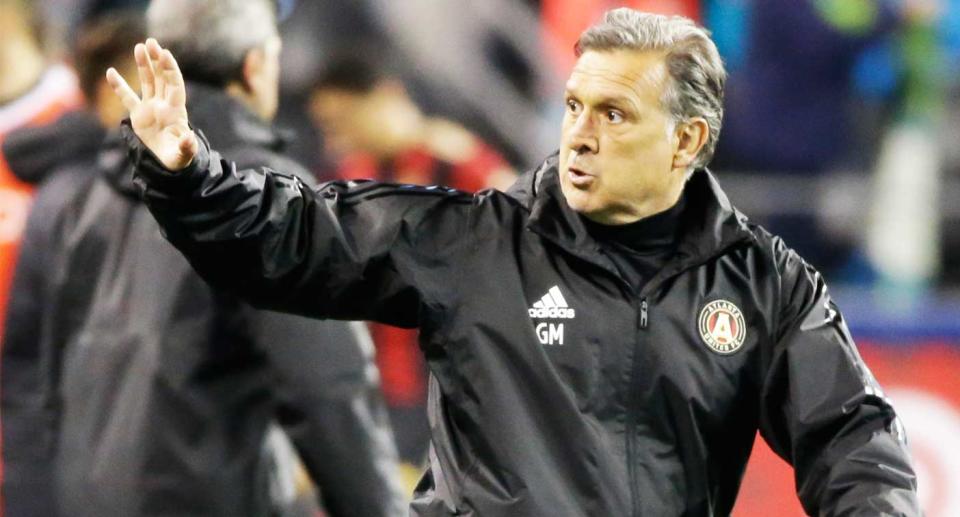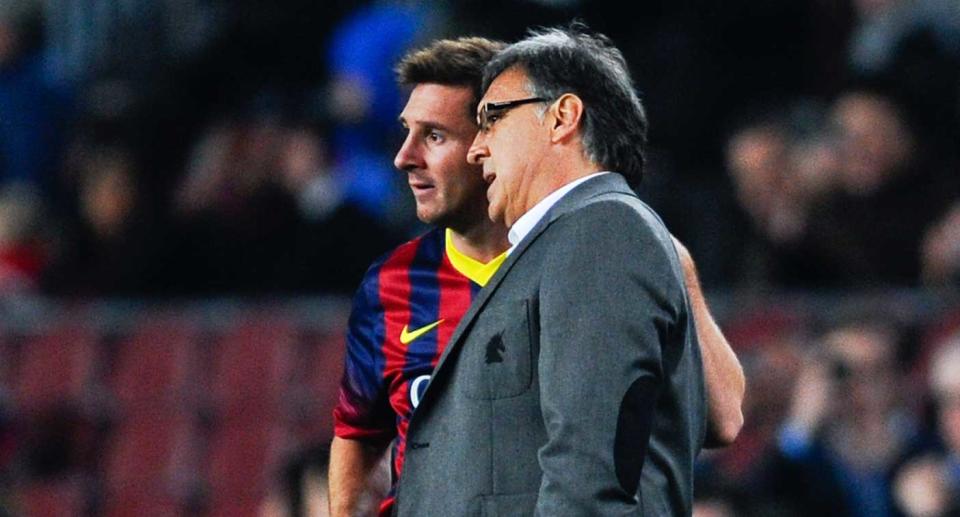Why Tata Martino went from coaching big stars to becoming big MLS coaching star

NEW YORK – The most famous member of Atlanta United is 54 years old and has receding, salt-and-pepper hair, an indelible tan and a generous smile. When the club travels, he is the one stopped most often for a picture or an autograph.
He has zero goals, zero assists, zero saves and zero tackles in Major League Soccer this season. Yet Gerardo Martino, the expansion club’s first head coach, who just goes by “Tata,” has a bigger hand in its early success than could ever be expressed by a stat sheet. Because just being competitive is a feat in your maiden season, and United has a solid 3-4-2 record.
[ Follow FC Yahoo on social media: Twitter | Facebook | Tumblr ]
The veteran Argentine, now on his 12th job in a two-decade managerial career that followed a long run as a star midfielder for Newell’s Old boys, is Atlanta United’s biggest name and its signature signing. Because Martino’s last two jobs were some of the biggest in the business: coaching Lionel Messi at Barcelona and then again with Argentina’s national team.
But here he is, in a dining room of a Midtown hotel, on the eve of a matchup with New York City FC, watching the D.C. United vs. Montreal Impact game on his cell phone. Before that, he watched the Boca Juniors-Estudiantes bout back in his home country. A few hours earlier before the team flew to New York, he put the Barca-Villarreal match on the bus TVs. And at the airport in Atlanta, he’d taken in Granada vs. Real Madrid.
Martino is a soccer junkie. And that’s part of what brought him here to America, to an expansion team in a league that isn’t yet a hot destination for the world’s biggest coaches.
Because for as much as Atlanta has impressed with its spending, ambition and sizable following, landing Martino was nevertheless a major coup. Even club president Darren Eales admitted to Goal.com that he was “cynical” when word reached him through the agent pipeline that Martino was keen on the job.
“My immediate thought,” Eales said before the season, “was that he couldn’t really be that interested.”
Eales and technical director Carlos Bocanegra flew to Argentina anyway last summer to meet Martino after he resigned from the national team following two straight Copa America finals lost to Chile on penalties. Martino showed up with a fat file of scouting reports on MLS teams. This alone contrasted sharply with other foreign managers who arrived in MLS, long after their hiring, with no understanding of its rules or indeed its stylistic particulars.
“That’s what we do as coaches,” Martino explained to Yahoo Sports, in Spanish through an interpreter. “When we meet club directors, we want to be prepared and show a good understanding of the league. I wanted them to hire me. So I had to bring a big folder.”
Martino’s vision for the new club matched up well with that of his would-be employers, and he signed on Sept. 27. He may have had offers from other clubs. He almost certainly did. But Martino is coy on this.
“It doesn’t matter,” he said. “I came here. That’s all that matters.”
He had good reasons for committing to Atlanta with a two-year contract. “Firstly, because I like the country,” he said. “Secondly, because I liked the proposal the club gave me. And thirdly, because I wanted to escape those high public expectations that people had in those other jobs.”
This was the crux of it. After a year at Barca and two with Argentina, Martino had grown weary of the perpetual scrutiny and of the attendant responsibilities of managing those teams – the politicking, the searing media spotlight. “There comes a point where people just keep talking about you,” he said. “The whole world has an opinion in those two jobs. There’s always a high public exposure, and you reach a point after three years where you just want to say, ‘Enough.’ ”
To emphasize the point, the warm and overwhelmingly charming Martino picked up my notebook and theatrically faux-scribbled on page after page after page. “The newspaper … Martino … Martino … Martino …” he said in English. “Very tired. One day, I think, ‘No more Martino.’ ” And then he chuckled, as he often would over the course of a 40-minute chat.
One of Martino’s Barcelona predecessors, Pep Guardiola, and his successor, Luis Enrique, both burned out on the job as well, announcing their departures and sabbaticals after four and three seasons, respectively. “They were players at the club [first], so they knew what expectations were like going into the job,” Martino said of resigning from Barca after just one year. “For me, I was new at the club. So I think I reached that point sooner.”
After three years in the sport’s steamiest pressure cookers, Martino was ready to be just a coach again. He beams when he talks about being able to just focus on setting out cones and handing out pinnies and drawing up X’s and O’s again.
“Only coach. No more. It’s very nice,” Martino said in English before switching back to Spanish. “That’s what I am. I’m a coach. In Atlanta, I went back to being a coach. I missed being a coach. We’re hired as coaches to put a team together and to win. Everything else is extra. And I don’t like all that other stuff.”

In Atlanta, he doesn’t have to deal with a lot of the other stuff. Whereas Barca’s and Argentina’s practices were regularly attended by hundreds of reporters, sometimes nobody at all turns up for training in Atlanta. What’s more, the club offered a blank slate, something a coach from Argentina could only dream of. He didn’t have to contend with 100 years of club history and identity and ossified ideas of how to play and do things.
“Absolutely, it’s the best thing that can happen to a coach,” Martino said. “I wanted to come to a place where I didn’t have that kind of baggage.”
Martino has bought into MLS, and he’s learned the players and teams as well as the rules that tripped up so many other foreign managers, whose success rate has historically been low. “It’s complicated to learn the rules,” Martino said. “But once you know them it’s not complicated to exist within them.”
He ascribed his early success to doing his homework and the club management granting him the freedom and trust to implement his ideas so everyone adheres to his philosophy, style and methods. He didn’t watch MLS before talking to Atlanta. The league hardly ever used to be on television in Argentina, he says, although that’s changing.
He has been impressed by what he has encountered.
“So many people told me about the physicality of the league,” Martino said. “But they forgot to tell me it’s also a league where teams play really good soccer.”
It hasn’t been a hard adjustment, Martino said, going from coaching two of the world’s deepest and most talented teams to a squad of lesser gifts. “I try not to make comparisons between who I’ve coached,” he said. “And I haven’t always coached the best in the world. At the beginning of my career, I wasn’t coaching players like Messi. The outlier has been the last three years, coaching the best in the world, when I was in those very rare places.
“But the rest of my career, I’ve been coaching good players but not the best in the world. Really all coaches are accustomed to coaching …” said Martino, pausing to ponder the right words. “Normal players,” he added.
It helps that Atlanta United built a core of South American players, recruiting the young and highly-touted Miguel Almiron, Josef Martinez and Hector Villalba, among others, who share a language with their coach. “One thing we all agreed on, the directors and I, was that the club was going to bet on younger players,” Martino said. “It wouldn’t have been a problem if they’d been from Europe. But it helps that I can communicate better.”
He is learning English, mostly understanding the questions posed to him. But in the meantime, he gets by on the field. “I’m not here doing a dissertation on English or giving long talks, so soccer-wise I’m doing fine,” Martino said with a grin. He switches to English: “No need sentences – only words.”
Martino’s impact on the club has been broad, getting involved with the nascent academy even though he knows the fruits of that labor won’t be picked until long after he leaves. He doesn’t know when that will be exactly. As a policy, he doesn’t sign long contracts. When his deal is up after the 2018 season, there is a mutual option for two more years. But Martino doesn’t plan that far ahead.
“My career plan ends in December 2018 when my contract ends with Atlanta United,” Martino said. “It depends on how I’m functioning. How I feel. How my family feels. I don’t really have an answer about what’s going to happen in January of 2019. Today, I can say I feel really good working in the U.S.”
Martino misses his family and friends back in his hometown of Rosario. “Above all because of my age,” he said. “I’m in the nostalgia stage of life.”
His two daughters are lawyers there. His son is in college, studying to become an accountant. His wife ferries back and forth, spending a few weeks at a time in each place.
But Martino likes it in Atlanta.
“Generally, it’s easier living here,” he said. “There’s less to worry about. You don’t have to look over your shoulder.”
And you don’t have to worry about the press, and the machinations of inherently political clubs and institutions. Speaking of which, Martino is pleased that I haven’t asked him about Messi or Barcelona or the shambles that is the Argentine federation. It’s the first time, he says, since leaving Argentina that an interview hasn’t turned into an extended debriefing of his former employers and jobs.
“Congratulations,” Martino said in English with a hearty laugh, shaking my hand.
An Argentinian couple has poked its head into the door of the room. A woman is wearing a Newell’s jersey. Martino greets them warmly and sits them down for a chat. He’s a long way from home. A long way from his former jobs.
But Newell’s and Argentina and his fame never quite leave him.
Leander Schaerlaeckens is a soccer columnist for Yahoo Sports. Follow him on Twitter @LeanderAlphabet.
More from FC Yahoo:
• Juventus reaches second Champions League final in three years with win over Monaco
• Iranian Messi-lookalike bears an uncanny resemblance to the Barcelona star
• Jozy Altidore not getting enough credit for immense impact on Toronto FC
• Chelsea moves within a win of Premier League title after crushing Middlesbrough
• Biggest underachievers and overachievers of 2016-17 European league seasons



